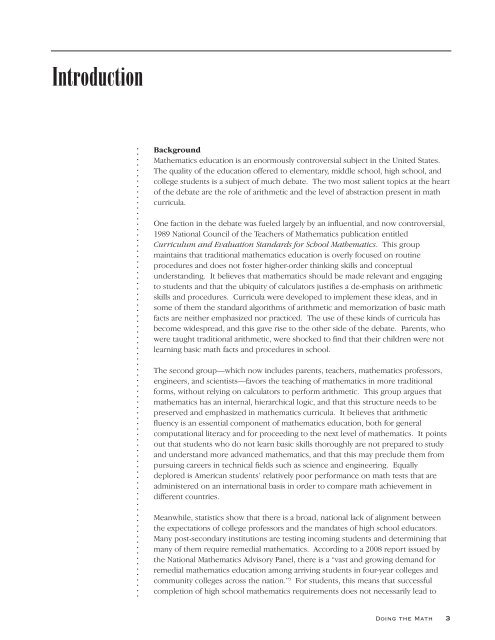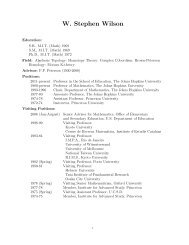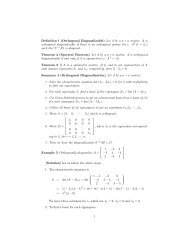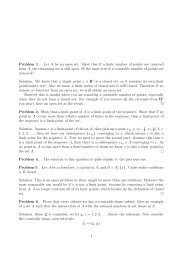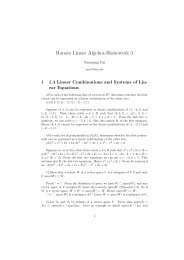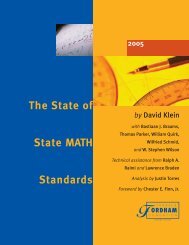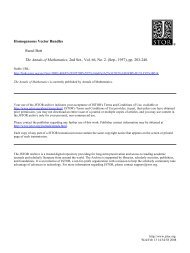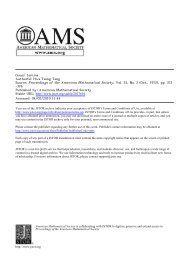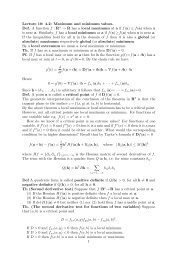Doing the Math - JHU Mathematics - Johns Hopkins University
Doing the Math - JHU Mathematics - Johns Hopkins University
Doing the Math - JHU Mathematics - Johns Hopkins University
You also want an ePaper? Increase the reach of your titles
YUMPU automatically turns print PDFs into web optimized ePapers that Google loves.
Introduction<br />
. . . . . . . . . . . . . . . . . . . . . . . . . . . . . . . . . . . . . . . . . . . . . . . . . . . . . . . . . . . . . . . . . . . . . . . . . . . . . . . . . . . .<br />
Background<br />
Ma<strong>the</strong>matics education is an enormously controversial subject in <strong>the</strong> United States.<br />
The quality of <strong>the</strong> education offered to elementary, middle school, high school, and<br />
college students is a subject of much debate. The two most salient topics at <strong>the</strong> heart<br />
of <strong>the</strong> debate are <strong>the</strong> role of arithmetic and <strong>the</strong> level of abstraction present in math<br />
curricula.<br />
One faction in <strong>the</strong> debate was fueled largely by an influential, and now controversial,<br />
1989 National Council of <strong>the</strong> Teachers of Ma<strong>the</strong>matics publication entitled<br />
Curriculum and Evaluation Standards for School Ma<strong>the</strong>matics. This group<br />
maintains that traditional ma<strong>the</strong>matics education is overly focused on routine<br />
procedures and does not foster higher-order thinking skills and conceptual<br />
understanding. It believes that ma<strong>the</strong>matics should be made relevant and engaging<br />
to students and that <strong>the</strong> ubiquity of calculators justifies a de-emphasis on arithmetic<br />
skills and procedures. Curricula were developed to implement <strong>the</strong>se ideas, and in<br />
some of <strong>the</strong>m <strong>the</strong> standard algorithms of arithmetic and memorization of basic math<br />
facts are nei<strong>the</strong>r emphasized nor practiced. The use of <strong>the</strong>se kinds of curricula has<br />
become widespread, and this gave rise to <strong>the</strong> o<strong>the</strong>r side of <strong>the</strong> debate. Parents, who<br />
were taught traditional arithmetic, were shocked to find that <strong>the</strong>ir children were not<br />
learning basic math facts and procedures in school.<br />
The second group—which now includes parents, teachers, ma<strong>the</strong>matics professors,<br />
engineers, and scientists—favors <strong>the</strong> teaching of ma<strong>the</strong>matics in more traditional<br />
forms, without relying on calculators to perform arithmetic. This group argues that<br />
ma<strong>the</strong>matics has an internal, hierarchical logic, and that this structure needs to be<br />
preserved and emphasized in ma<strong>the</strong>matics curricula. It believes that arithmetic<br />
fluency is an essential component of ma<strong>the</strong>matics education, both for general<br />
computational literacy and for proceeding to <strong>the</strong> next level of ma<strong>the</strong>matics. It points<br />
out that students who do not learn basic skills thoroughly are not prepared to study<br />
and understand more advanced ma<strong>the</strong>matics, and that this may preclude <strong>the</strong>m from<br />
pursuing careers in technical fields such as science and engineering. Equally<br />
deplored is American students’ relatively poor performance on math tests that are<br />
administered on an international basis in order to compare math achievement in<br />
different countries.<br />
Meanwhile, statistics show that <strong>the</strong>re is a broad, national lack of alignment between<br />
<strong>the</strong> expectations of college professors and <strong>the</strong> mandates of high school educators.<br />
Many post-secondary institutions are testing incoming students and determining that<br />
many of <strong>the</strong>m require remedial ma<strong>the</strong>matics. According to a 2008 report issued by<br />
<strong>the</strong> National Ma<strong>the</strong>matics Advisory Panel, <strong>the</strong>re is a “vast and growing demand for<br />
remedial ma<strong>the</strong>matics education among arriving students in four-year colleges and<br />
community colleges across <strong>the</strong> nation.” 3 For students, this means that successful<br />
completion of high school ma<strong>the</strong>matics requirements does not necessarily lead to<br />
<strong>Doing</strong> <strong>the</strong> <strong>Math</strong> 3


